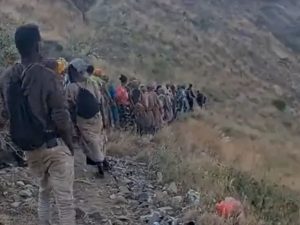Saudis accused of killing asylum seekers
Saudi Arabian border troops have killed hundreds of Ethiopian migrants and asylum seekers trying to cross the Yemen-Saudi border, according to a new report from NGO Human Rights Watch (HRW).
The killings are said to have occurred between March 2022 and June 2023, the report said.
The Saudi government has denied the claims, but HRW says that if committed as part of a Saudi government policy to murder migrants, these killings, which appear to continue, would be a crime against humanity.
 The report, titled ‘They Fired on Us Like Rain: Saudi Arabian Mass Killings of Ethiopian Migrants at the Yemen-Saudi Border’, found that Saudi border guards have used explosive weapons to kill many migrants and shot other migrants at close range, including many women and children, in a widespread and systematic pattern of attacks.
The report, titled ‘They Fired on Us Like Rain: Saudi Arabian Mass Killings of Ethiopian Migrants at the Yemen-Saudi Border’, found that Saudi border guards have used explosive weapons to kill many migrants and shot other migrants at close range, including many women and children, in a widespread and systematic pattern of attacks.
“In some instances, Saudi border guards asked migrants what limb to shoot, and then shot them at close range. Saudi border guards also fired explosive weapons at migrants who were attempting to flee back to Yemen,” the report said.
“Saudi officials are killing hundreds of migrants and asylum seekers in this remote border area out of view of the rest of the world,” said HRW spokesperson Nadia Hardman.
“Spending billions buying up professional golf, football clubs, and major entertainment events to improve the Saudi image should not deflect attention from these horrendous crimes,” Ms Hardman said.
In compiling the report, HRW interviewed 42 people, including 38 Ethiopian migrants and asylum seekers who tried to cross the Yemen-Saudi border between March 2022 and June 2023, and four relatives or friends of those who tried to cross during that period.
The group also analysed more than 350 videos and photographs posted to social media or gathered from other sources, and several hundred square kilometres of satellite imagery.
Around 750,000 Ethiopians live and work in Saudi Arabia. While many migrate for economic reasons, a number have fled because of serious human rights abuses in Ethiopia, including during the recent, brutal armed conflict in the north.
HRW has documented killings of migrants at the border with Yemen and Saudi Arabia since 2014, but it says the killings appear to be a deliberate escalation in terms of the number and the deliberate targeting of victims.
Migrants and asylum seekers told HRW they crossed the Gulf of Aden in unseaworthy vessels, Yemeni smugglers then took them to Saada governorate, currently under the control of the Houthi armed group, on the Saudi border.
Many said Houthi forces worked with smugglers and would extort them or transfer them to what migrants described as detention centres, where people were abused until they could pay an “exit fee”, the report said.
“Migrants in groups of up to 200 people would regularly try to cross the border into Saudi Arabia, often making multiple attempts after Saudi border guards pushed them back. Migrants said that their groups had more women than men and unaccompanied children,” the report said.
HRW identified Saudi border guard posts from satellite images that are consistent with the migrants’ accounts.
The report cites people traveling in groups describing d being attacked by mortar projectiles and other explosive weapons from the direction of Saudi border guards once they had crossed the border.
Twenty-eight separate incidents with Saudi border guards using explosive weapons were documented. Survivors said the Saudis sometimes held them in detention facilities, in some cases for months.
There were also descriptions of horrific scenes of women, men, and children’s bodies strewn across the mountainous landscape severely injured, already dead and dismembered.
“First I was eating with people and then they were dying. There are some people who you cannot identify because their bodies are thrown everywhere. Some people were torn in half,” the report quotes one survivor saying.
HRW carried out a digital investigation of videos posted to social media or sent directly to the agency and verified and dead and wounded migrants on the trails, in camps, and in medical facilities.
Geospatial analysis also revealed growing burial sites near the migrant camps and expanding border security infrastructure.
Independent forensic experts have analysed and verified videos and photographs, concluding that there were “clear patterns consistent with the explosion of munitions with capacity to produce heat and fragmentation”.
The report said people traveling in smaller groups or on their own said once they crossed the Yemen-Saudi border that Saudi border guards carrying rifles shot at them. They also described guards beating them with rocks and metal bars.
“Fourteen interviewees witnessed or were themselves wounded in shooting incidents at close range. Six were targeted both by explosive weapons and by shootings,” the report said.
“Saudi Arabia should immediately and urgently revoke any policy, whether explicit or de facto, to use lethal force on migrants and asylum seekers, including targeting them with explosive weapons and close-range shootings,” Ms Hardman said.
“The government should investigate and appropriately discipline or prosecute security personnel responsible for unlawful killings, wounding, and torture at the Yemen border,” she said.
“Concerned governments should publicly call for Saudi Arabia to end any such policy and press for accountability. In the interim, concerned governments should impose sanctions on Saudi and Houthi officials credibly implicated in ongoing violations at the border.
“A UN-backed investigation should be established to assess abuses against migrants and whether killings amount to crimes against humanity.
“Saudi border guards knew or should have known they were firing on unarmed civilians. If there is no justice for what appear to be serious crimes against Ethiopian migrants and asylum seekers, it will only fuel further killings and abuses,” Ms Hardman said.












